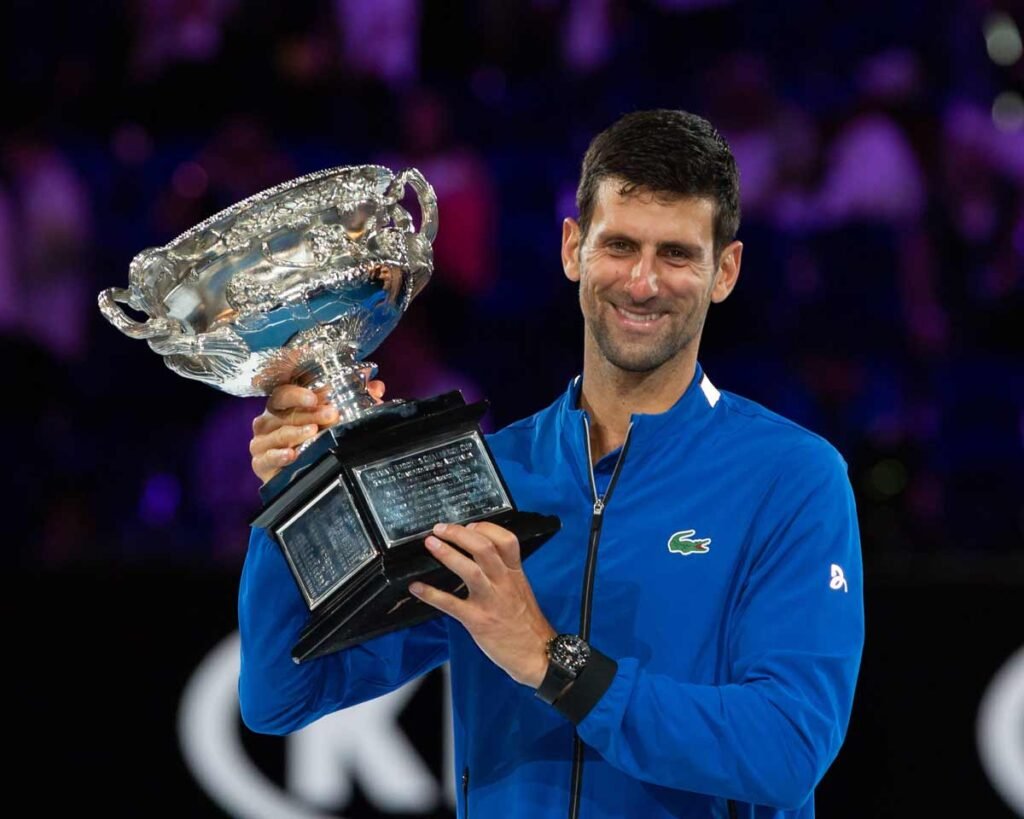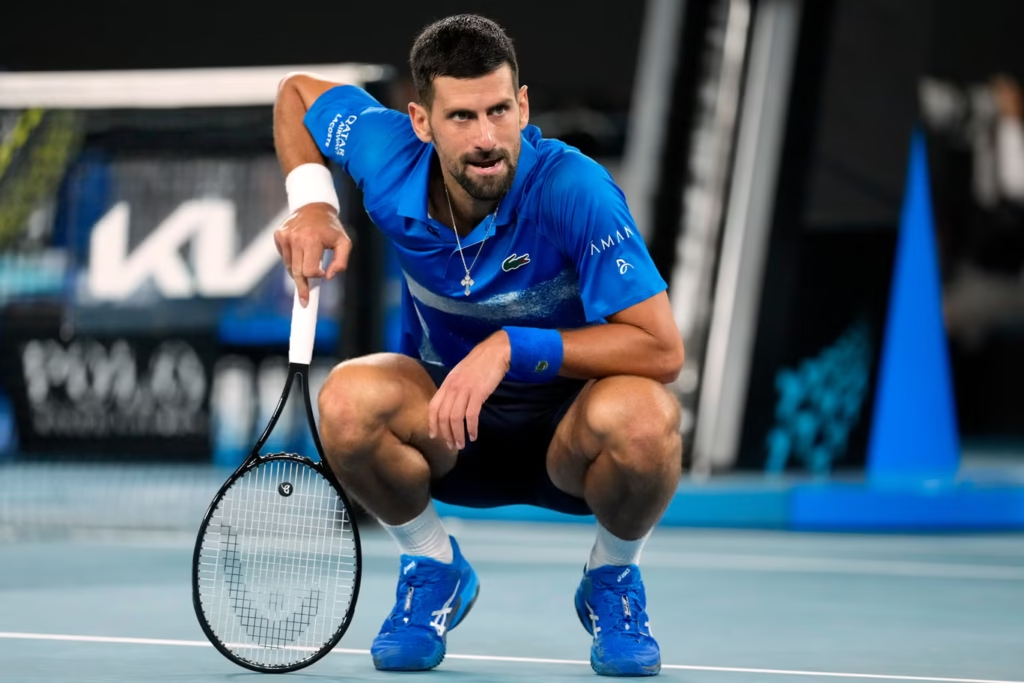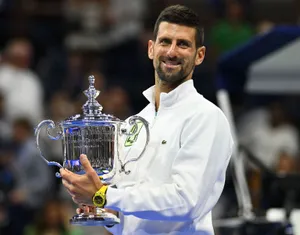| Category | Details |
|---|---|
| Full Name | Novak Djokovic |
| Nickname | Nole, The Djoker |
| Date of Birth | May 22, 1987 |
| Age (as of 2025) | 38 Years |
| Place of Birth | Belgrade, Serbia (formerly Yugoslavia) |
| Nationality | Serbian |
| Height | 6 ft 2 in (1.88 m) |
| Weight | 77 kg (approx.) |
| Playing Style | Right-handed (Two-handed backhand) |
| Turned Professional | 2003 |
| Coach | Goran Ivanišević (former), various over the years |
| Marital Status | Married to Jelena Djokovic |
| Children | Two (a son and a daughter) |
| Residence | Monte Carlo, Monaco |
| Career Titles (ATP) | Over 100 titles (Singles) |
| Grand Slam Titles | 24 (Record for men’s singles) |
| Australian Open Titles | 10 (Record) |
| French Open Titles | 3 |
| Wimbledon Titles | 7 |
| US Open Titles | 4 |
| ATP Finals Titles | 6 (Tied record with Federer) |
| Olympic Medals | Bronze Medal – 2008 Beijing Olympics |
| Career Grand Slam | Achieved (All four majors) |
| Double Career Grand Slam | Achieved (2021 – only male player) |
| Weeks as World No. 1 | 400+ weeks (Record) |
| Prize Money (Approx.) | Over $180 Million (highest in tennis) |
| Favourite Surface | Hard Court |
| Signature Shot | Backhand down the line |
| Diet & Fitness | Plant-based diet, yoga, meditation, and stretching |
| Languages Known | Serbian, English, French, Italian, German |
| Hobbies | Meditation, Reading, Family Time, Traveling |
| Philanthropy | Novak Djokovic Foundation – focuses on early childhood education |
| Personality Traits | Disciplined, Calm, Focused, Emotionally Balanced |
| Inspirational Quote | “The most important battle is the one you fight within yourself.” |
| Legacy | Widely considered one of the greatest tennis players of all time |
| Net Worth (Approx.) | $250 Million (as of 2025) |
Novak Djokovic Introduction
When the name Novak Djokovic is mentioned, the world instantly thinks of determination, discipline, and dominance. Born in Belgrade, Serbia, Djokovic is not just one of the greatest tennis players of all time — he is a symbol of resilience and self-belief.
Throughout his career, he has defied odds, broken records, and challenged some of the best players in history, including Roger Federer and Rafael Nadal.
Djokovic’s story is more than just about trophies; it’s about his rise from war-torn Serbia to the summit of world tennis. His journey reflects how talent, hard work, and mental toughness can overcome every barrier. Over the years, Djokovic has built an identity that blends physical excellence with unmatched mental strength, becoming a role model for millions across the world.
Novak Djokovic Early Life and Background
Novak Djokovic was born on May 22, 1987, in Belgrade, then part of Yugoslavia. His parents, Srdjan and Dijana Djokovic, ran a small business, and his family lived a modest life. From an early age, Djokovic showed interest in sports, especially skiing and football. However, destiny had chosen tennis for him.
When he was just four years old, Novak picked up a tennis racket and never looked back. His parents noticed his natural coordination, and soon, he began training seriously. Despite growing up during a time of political instability and economic challenges, Djokovic’s family supported his dream wholeheartedly.
As a child, Novak trained at a tennis camp run by Jelena Genčić — a former Yugoslav tennis player who had also coached Monica Seles. Genčić quickly recognized Djokovic’s extraordinary focus and dedication. She once said, “This boy is destined to be the number one in the world.” Her words would turn prophetic.
Novak Djokovic Struggles During Early Years
Djokovic’s childhood wasn’t easy. The NATO bombings in 1999 deeply affected Serbia, and like many others, his family lived through nights of fear and uncertainty. Yet, Djokovic practiced every day, often hitting balls in a bomb shelter or underground basements when it wasn’t safe to play outside.
He later said that those difficult times built his mental resilience, shaping his ability to stay calm under pressure. The hardship taught him gratitude, patience, and the power of inner strength — qualities that would define his playing style for decades.
When he turned 12, Novak moved to Germany to train at the Nikola Pilić Tennis Academy. It was a major step that separated him from his family, but he knew it was necessary to improve. He trained intensely, adapting to the challenges of being in a foreign country, learning new languages, and developing the technical precision that later became his signature.

Novak Djokovic Rise in Professional Tennis
Djokovic turned professional in 2003, and within a few years, he began making his presence felt on the ATP Tour. In the early stages, he was known for his quick movement, sharp reflexes, and excellent return of serve — qualities that would later make him one of the greatest defensive players in tennis history.
By 2007, Djokovic had already broken into the Top 10 in the ATP rankings. His first major breakthrough came in 2008, when he won his first Grand Slam title at the Australian Open, defeating Jo-Wilfried Tsonga in the final. This victory made him the first Serbian player to win a Grand Slam singles title, sparking national pride across his homeland.
From that moment, Djokovic’s career trajectory changed completely. He was no longer the young challenger — he became a serious contender among the “Big Three” era of tennis, which included Roger Federer, Rafael Nadal, and himself.
Novak Djokovic The Big Three Era
The rivalry between Djokovic, Federer, and Nadal is considered the greatest in tennis history. Each brought a different style to the court — Federer with grace and precision, Nadal with power and endurance, and Djokovic with mental and technical balance.
Between 2011 and 2024, Djokovic emerged as the most consistent player among the three. He dominated the ATP rankings, often holding the World No. 1 position for record-breaking weeks. His flexibility, movement, and ability to return even the most powerful serves made him a nightmare for opponents.
In 2011, Djokovic had one of the best seasons ever recorded in tennis history. He won three Grand Slams that year — the Australian Open, Wimbledon, and the US Open — and secured 10 titles overall. His consistency and fitness were unmatched, and he ended the year as the undisputed world number one.
Novak Djokovic Mental Strength and Discipline
What truly separates Novak Djokovic from many athletes is his mental discipline. He practices mindfulness, yoga, and meditation — all of which contribute to his calm and focus under pressure.
Djokovic has often spoken about the importance of mental health, gratitude, and positive visualization. He believes that tennis is not just a physical game but a mental and emotional battle. His ability to come back from two sets down or save match points in critical situations has become legendary.
One of his most remarkable qualities is his belief in constant improvement. Even after becoming number one, Djokovic continued refining his serve, backhand, and movement. He believes that growth never stops — a philosophy that keeps him relevant even as younger players enter the circuit.
Novak Djokovic Playing Style and Strengths
Djokovic’s playing style is built on balance, flexibility, and anticipation. He is widely regarded as the best returner of serve in tennis history. His ability to read the ball early and counter powerful serves gives him a massive advantage.
Some of his core strengths include:
- Two-Handed Backhand: One of the most powerful and consistent in tennis, capable of both precision and defense.
- Movement: His court coverage is exceptional; he slides efficiently even on hard courts.
- Return Game: Djokovic can neutralize aggressive servers with deep, controlled returns.
- Endurance: His physical fitness allows him to play long rallies without losing intensity.
- Focus Under Pressure: He often performs his best in tiebreaks or deciding sets.
This combination of skills has made him nearly unbeatable on all surfaces — clay, grass, and hard court.
Novak Djokovic Achievements and Records
Novak Djokovic’s career achievements are nothing short of historic. His records speak for themselves and place him among the greatest athletes in the world — not just in tennis.
Major Achievements:
- 24 Grand Slam Singles Titles — the most in men’s tennis history.
- 10 Australian Open Titles — a record that showcases his dominance on hard courts.
- 3 French Open Titles, 7 Wimbledon Titles, and 4 US Open Titles.
- Record 400+ Weeks as World No. 1, surpassing Federer’s previous record.
- Career Grand Slam — winning all four majors at least once.
- Double Career Grand Slam — achieved in 2021, the only male player to do so.
- ATP Finals Winner (6 times) — tied with Federer for the record.
- Over 100 Career Titles across singles and team competitions.
These milestones highlight Djokovic’s consistency, versatility, and longevity across different surfaces and eras.
Novak Djokovic Rivalries and Iconic Matches
Djokovic’s career wouldn’t be as legendary without his epic rivalries. His matches with Rafael Nadal and Roger Federer are among the most-watched and celebrated in tennis history.
Against Rafael Nadal
Their rivalry is the most prolific in men’s tennis. Djokovic leads their head-to-head record, and their 2012 Australian Open Final — which lasted nearly six hours — remains one of the greatest matches ever played. Djokovic’s ability to outlast Nadal on clay courts, especially in the 2021 French Open semifinal, proved his all-surface dominance.
Against Roger Federer
Djokovic and Federer have played numerous classics, with Djokovic often emerging victorious in close battles. The 2019 Wimbledon Final is a prime example — Djokovic saved two championship points to win in a thrilling five-set match, marking one of his most dramatic triumphs.
Other Rivals
Djokovic also faced fierce competition from players like Andy Murray, Stan Wawrinka, and the younger generation — Carlos Alcaraz and Daniil Medvedev. Despite the rise of new stars, Djokovic continues to stand tall, adapting his strategies and fitness to remain at the top.
Novak Djokovic Injuries, Setbacks, and Comebacks
Like every champion, Djokovic has faced his share of injuries and controversies.
In 2017, he suffered from a persistent elbow injury that forced him to take a break from tennis. Many doubted if he would ever return to his peak. But Djokovic’s response was extraordinary — he rebuilt his game, improved his technique, and made a stunning comeback in 2018 by winning Wimbledon and the US Open.
In 2020–2022, Djokovic faced challenges due to vaccination policies and missed several major tournaments. Yet, he returned with the same intensity, winning more titles and breaking new records. His mental toughness during these phases has inspired countless athletes worldwide.
Novak Djokovic Personality and Off-Court Life
Beyond the court, Novak Djokovic is known for his discipline, humor, and humility. He follows a strict plant-based diet, practices meditation, and believes in holistic well-being.
Djokovic is also fluent in multiple languages — Serbian, English, French, Italian, and German — showcasing his global persona. He’s deeply connected to his Serbian roots and often credits his success to his upbringing and the people who supported him through difficult times.
Off the court, he enjoys spending time with his family — his wife Jelena Djokovic and their two children. Together, they lead the Novak Djokovic Foundation, which focuses on early childhood education and helping underprivileged children in Serbia.
His humanitarian work, calm demeanor, and respect for opponents have earned him admiration not just from fans, but also from his peers.
Novak Djokovic Mindset and Philosophy
Djokovic’s mindset is one of the biggest reasons for his sustained success. He practices gratitude daily and believes in controlling emotions under pressure. He once said, “The most important battle is the one you fight within yourself.”
His training routines combine physical, mental, and emotional exercises — including visualization and breathing techniques. Djokovic believes in preparing the mind as much as the body. This holistic approach has made him one of the most mentally strong athletes in the world.
He often emphasizes self-belief, saying that champions are made when they trust themselves even when no one else does. That attitude helped him overcome setbacks and criticism throughout his journey.

Novak Djokovic Legacy and Impact
Novak Djokovic’s legacy extends beyond numbers. He has redefined consistency, pushed physical boundaries, and inspired a generation of athletes to focus on discipline and mental health.
His story from a small town in Serbia to the pinnacle of tennis represents hope and perseverance. Djokovic has proven that greatness is not just about talent but also about the ability to stay committed, humble, and hungry for improvement.
Even as he continues to play at the highest level in his late 30s, Djokovic remains a symbol of longevity and dedication. Young players admire his professionalism, while fans respect his humility.
Conclusion
The journey of Novak Djokovic is one of the most inspiring tales in modern sports. From humble beginnings to global dominance, his life reflects the power of determination and inner strength.
He has shattered records, faced adversity, and built a legacy that will stand for decades. But beyond trophies and rankings, Djokovic has changed the way the world sees tennis — turning it into a blend of athleticism, intellect, and emotional control.
Novak Djokovic is not just one of the greatest tennis players of all time — he is an example of what relentless effort, discipline, and belief can achieve. His story reminds us that greatness isn’t given; it’s earned, one serve, one rally, and one victory at a time.


